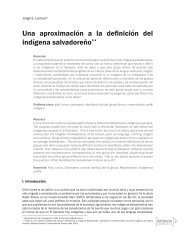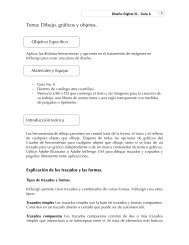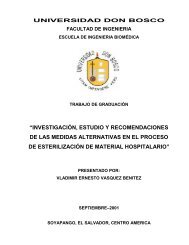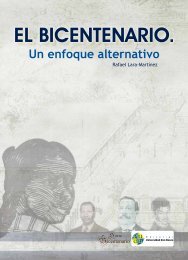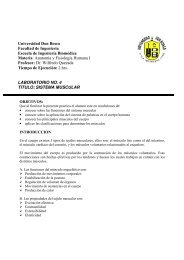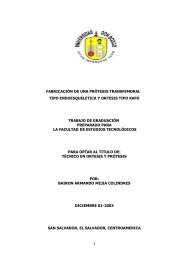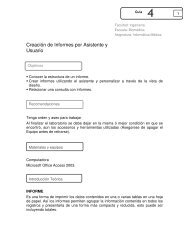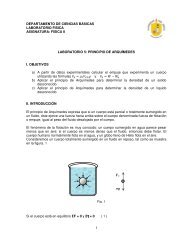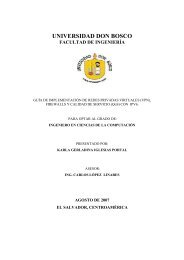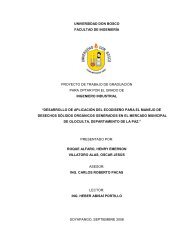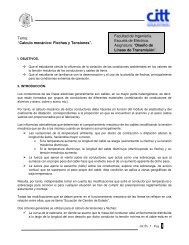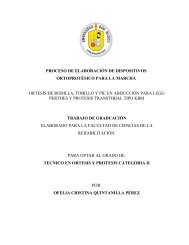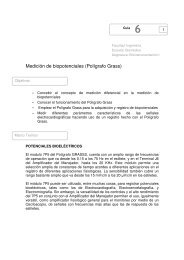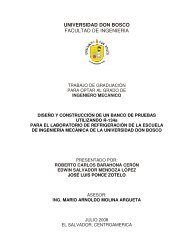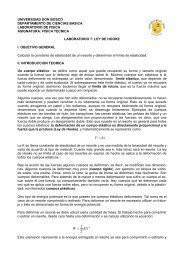cuentos de barro - DSpace Universidad Don Bosco
cuentos de barro - DSpace Universidad Don Bosco
cuentos de barro - DSpace Universidad Don Bosco
You also want an ePaper? Increase the reach of your titles
YUMPU automatically turns print PDFs into web optimized ePapers that Google loves.
La metodología <strong>de</strong> la traducción es<br />
bastante compleja. El proceso <strong>de</strong><br />
traducción ha sido compuesto por<br />
diferentes etapas <strong>de</strong> una forma un<br />
tanto circular: la lectura <strong>de</strong>l original<br />
la interpretación el análisis <strong>de</strong><br />
vocabulario relectura <strong>de</strong>l el original<br />
comparación <strong>de</strong> idiomas y<br />
comprobación <strong>de</strong> mis hipótesis con los<br />
informantes nativos interpretación<br />
(re) lectura <strong>de</strong>l original. Aunque<br />
soy un hablante nativo <strong>de</strong> español,<br />
nacido y educado en El Salvador, es<br />
un <strong>de</strong>safío el tratar <strong>de</strong> <strong>de</strong>scifrar el<br />
vocabulario utilizado en los Cuentos <strong>de</strong><br />
<strong>barro</strong>. Mis informantes nativos rurales<br />
<strong>de</strong>l país, las fotografías <strong>de</strong> los primeros<br />
años <strong>de</strong>l siglo XX, mi interacción con<br />
los pobladores <strong>de</strong> las zonas indígenas,<br />
y mis visitas a los mundos indígenas me<br />
han ayudado a revivir las <strong>de</strong>scripciones<br />
<strong>de</strong>l libro. Mi dominio <strong>de</strong>l idioma inglés<br />
me acredita para traducir una obra<br />
<strong>de</strong> esta magnitud. Sin embargo, para<br />
que sonara más como el original, he<br />
estudiado las obras y traducciones que<br />
se han ocupado <strong>de</strong> la lengua vernácula,<br />
y he confiado en mis informantes<br />
que leyeron mis traducciones y<br />
corroboraron o no mis hipótesis acerca<br />
<strong>de</strong>l sentir <strong>de</strong> los <strong>cuentos</strong>. Los nombres<br />
<strong>de</strong> pájaros, árboles, barcos, <strong>de</strong>talles <strong>de</strong><br />
edificios renacentistas, y cosas por el<br />
estilo fueron otra investigación aparte.<br />
Esta traducción ha sido una cuestión<br />
mucho más compleja que reúne<br />
múltiples disciplinas en la mesa.<br />
6<br />
The translation methodology is quite<br />
complex. The translation process has<br />
been composed of different stages in a<br />
somewhat circular fashion: reading the<br />
original interpreting analysis<br />
of vocabulary reading the original<br />
comparing languages and testing<br />
my choices with native informants<br />
interpreting (re) reading the original.<br />
Although I am a native speaker of<br />
Spanish, born and educated in El<br />
Salvador, it is a challenge to try to<br />
<strong>de</strong>cipher the vocabulary used in<br />
Tales of Clay. Native rural Salvadoran<br />
informants, photographs of the early<br />
years of the twentieth century, my<br />
interaction with villagers of indigenous<br />
areas, and my visits to the indigenous<br />
worlds have helped me to relive the<br />
<strong>de</strong>scriptions of the book. My command<br />
of the English language qualifies me<br />
to translate a work of this magnitu<strong>de</strong>.<br />
However, to make it sound more like<br />
the original, I have studied works and<br />
translations that have <strong>de</strong>alt with the<br />
vernacular; and I have relied on my<br />
informants who read my translations<br />
and tested my hypothesis regarding<br />
the feel of the tales. Names of birds,<br />
trees, boats, specifics of renaissance<br />
buildings, and the like have been a<br />
research by themselves.<br />
This translation has been a much<br />
more complex matter that brings<br />
multiple disciplines into play.



